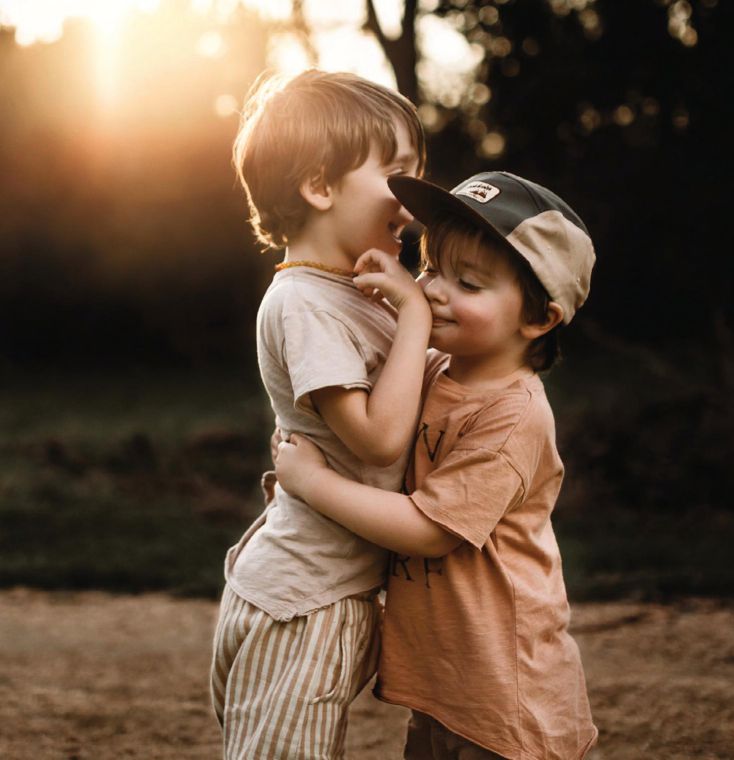NAVIGATING A WORLD OF DIFFERENCES
Today, Charlie is 10, Jude is 8, and Eileen and her husband Willy have welcomed a third child into their family: Billie. While the past few years have brought many challenges, the family has learned to navigate their differences, finding ways to connect and support each other's unique needs.
Charlie's needs are the most complex. Because he is nonverbal, he struggles to communicate anything beyond his most basic needs, which he conveys using an iPad. He also engages in dangerous and self-injurious behaviors like pica, the compulsive eating of non-edible items. These behaviors require 24/7 supervision, impacting his ability to go to school without one-on-one support, which the family has been unable to acquire. Luckily, Charlie has been approved for 40 hours of applied behavior analysis (ABA) therapy, which has been helping him learn important communication and self-care skills while keeping him occupied during the day.
On the other hand, Jude is very talkative and inquisitive. He loves learning and being challenged at school but struggles with anxiety. Bullying only triggered his anxiety further, making him fearful of going to school and requiring him to transition to private school.
"They are very different from one another," says Eileen. "Their needs clash quite often, because Jude wants to play with his brother, Charlie, but Charlie likes to be alone. Charlie also likes to stim using Jude's toys, dropping them over and over, which creates issues in their interactions. There are moments when Charlie will be in the mood to play catch or tag with Jude, but these moments are very rare, only a few times a year."
These moments of rejection can be difficult for Jude, so Eileen has a weekly tradition where they spend quality time together one-on-one. Every Saturday, she and Jude go on an adventure, whether playing soccer at the park, going to get ice cream or buying Pokémon cards. Then, they get some fast food to bring home for the family.
"While it breaks my heart to see Jude sad when Charlie pushes him away, I also see all the amazing ways in which having Charlie as a big brother, has a positive impact on Jude," she explains. "Jude seems to accept differences in people in the most
natural way. He's compassionate and always wants people around him to be happy. He's the kind of child who comes to you and asks if you're okay, if you look sad. Jude always sticks by Charlie."

BROTHERS IN ARMS: Charlie and Jude having a brotherly moment; "It took time for us to find our 'new normal' after Charlie's autism diagnosis. But we have our own little routine now that everyone seems to enjoy."
Community outings are often too overwhelming for Charlie, so Eileen and Willy prioritize quiet time for the entire family to be together. Often, that involves parallel play, with Charlie and Jude sharing space, but playing separately. When they do go out to a pumpkin patch or a birthday party, the family takes separate cars, so if something happens, one child can leave while the other stays.
"I've learned through my experiences raising a child with a disability, that you have to learn to adapt," Eileen says. "I'm constantly readjusting my expectations. It's all about finding the balance between not doing things at all, because they're too overwhelming, and forcing our kiddos to do things because that's what other families do. It took time for us to find our 'new
normal' after Charlie's autism diagnosis. But we have our own little routine now that everyone seems to enjoy. We've come to terms with the fact that we can't do things like most families do, but there are still awesome things we can do to connect as a family. These things are what we focus on."
CARING FOR THE CAREGIVER
In a complex family situation where more than one child has a developmental disability, caregiving can be a heavy weight. It's important for parents to remember to take care of themselves and make space for their own needs and emotions.
"Work, in a way, is self-care for me. I know it sounds funny, but working while Charlie and Jude are at school and ABA, gives me purpose. It's also less stressful. At home, if I'm not looking, I have to worry that Charlie will swallow something and hurt himself. At work, I can relax," says Eileen. "I also like going to the salon to get